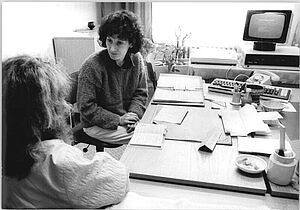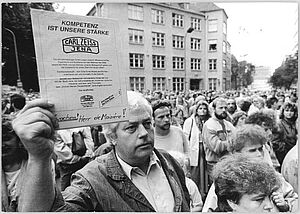
Since the 1970s, deindustrialization has formed an international basic process that fundamentally changed Western societies, their industrial-economic base and their sociostructural composition. Beginning in the United States, the decline in industrial production, closure of plants and the loss of industrial jobs mainly affected the classic industrial sectors and regions of the first industrialization, but also the production of electronic consumer goods.
Building on the hitherto dominant research in regional history, the project asks in a contemporary historical perspective about the supra-regional, global, cultural and gender-specific effects and meanings of deindustrialization. For this purpose, the IfZ has established an interdisciplinary cooperation network including, among others, the German Institute for Adult Education - Leibniz Center for Lifelong Learning (DIE) and the University of Luxembourg, Luxembourg Centre for Contemporary and Digital History (C2DH).

Moving past the history of factory closings, the project aims at a history of deindustrialization beyond the ruins, because the frequently told narrative of decline, viewed globally, represents only a small section of that transformation process. Western deindustrialization and global industrialization were mutually dependent. Both were simultaneous phenomena. The decline of the classical industries was closely linked to new economic dynamics – such as in trade or in the field of industry-related services. The concrete experience of deindustrialization was place-bound, but its causes were global and had an apparently abstract effect. The project brings these two strands together and thus contributes to a deeper historical understanding of the ambivalences and asynchronies in the era “after the boom”.
The following subprojects are being carried out at the IfZ:
- Deindustrialization and Consumer Society. Manufacturers, Trade, and Consumer Culture (Christian Marx)
- Deindustrialization and Gender. Industrial Work, Family Structures, and Gender Identities (Helena Schwinghammer)
- A Political Sound: K-Pop, French Rap, and the Postcolonial Interruption (1945-Present) (Paroma Ghose)
Subprojects at DIE:
- Deindustrialization and Adult Education: Politics, Learning Opportunities and Participation (Jonas Fey)
Subprojects at C2DH:
Bildnachweis
- Bundesarchiv, Bild 183-1990-0606-021 / Fotograf(in): Franke, Klaus.
- Bundesarchiv, Bild 183-1990-0906-029 / Fotograf(in): Kasper, Jan Peter.
